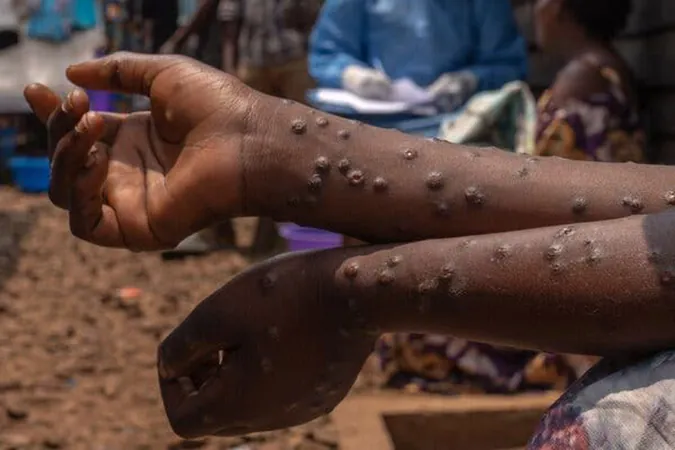
Church Leaders and Brothel Workers Unite Against Mpox Stigma in Zambia Amid Growing Fears
2025-01-22
Author: John Tan
Introduction
In Lusaka, the capital of Zambia, Pastor Bingu Musonza is haunted by memories of the HIV epidemic in the 1990s that devastated communities and fueled stigmatization. As he reflects on those dark times, he worries about a similar wave of stigma arising from the recent outbreak of Clade 1 mpox, a strain of the virus that has begun to spread alarmingly in the Democratic Republic of the Congo.
Response to Mpox Outbreak
In response to a significant spike in cases that led the World Health Organization (WHO) to declare mpox a public health emergency, Pastor Musonza has taken a proactive stance. Despite Zambia having only confirmed two cases so far, misinformation has taken root, with numerous rumors circulating on social media platforms, particularly in WhatsApp groups.
"History taught us a painful lesson with AIDS," Musonza says. "If we don’t act decisively to quell rumors and stigma once again, we risk damaging church attendance and community cohesion." This sentiment is shared among local Christian leaders who have banded together to dispel misinformation and support vulnerable groups within their communities.
Community Engagement
Utilizing various platforms, including church gatherings and social media, these leaders are combating the fear that has led some congregants to avoid church services completely. Musonza has mobilized a network of pastors who are actively engaging with their communities to clarify that mpox is neither linked solely to refugees from Congo nor a disease associated exclusively with certain demographics.
"We emphasize the message that mpox can affect anyone and it does not discriminate," Musonza explains. The collaboration has extended to confronting misconceptions in marginalized communities, including informal brothel workers who are facing renewed stigma due to fears surrounding the virus.
Support from Brothel Owners
Among the brothel owners in Lusaka's Garden Chilulu township, the outreach from church leaders has been met with appreciation. “We never imagined that pastors would come to us to discuss mpox,” says Ndoda Phiri, a local brothel owner. The pastors have helped distribute health education materials that combat the stigma and promote hygiene practices, reminding patrons that this disease can affect anyone, regardless of their background.
Economic Impact
The socio-economic realities for many in these communities underline the importance of addressing the stigma. Veteran sex worker Ratidzo explains, "If men don’t come to the brothel out of fear, our lives will be severely impacted." Another worker, Tanya, voiced similar concerns about the financial challenges that accompany the negative perceptions associated with the disease.
Positive Outcomes
Remarkably, church-led initiatives have already begun to yield positive results. Willard Nakala, an evangelist associated with Pastor Musonza, reports that church members now effectively challenge false narratives within their WhatsApp groups, with offenders facing expulsion for spreading dubious information. This newfound commitment to truth-telling serves as a crucial countermeasure against the stigma that can escalate rapidly.
Conclusion
As local communities take the lead, former Zambian lawmaker Mwansa Mbulakulima emphasizes the importance of grassroots efforts in managing the mpox situation. As the government ramps up its surveillance and prevention strategies, many locals express a preference for the guidance and reassurance provided by their pastors.
With proactive measures in place and a community-driven approach to fighting misinformation, there is hope that Zambia can avoid the levels of stigmatization experienced during the AIDS crisis. In this moment of uncertainty, the convergence of faith leaders and those often marginalized is a powerful testament to unity and resilience in the face of public health challenges.


 Brasil (PT)
Brasil (PT)
 Canada (EN)
Canada (EN)
 Chile (ES)
Chile (ES)
 Česko (CS)
Česko (CS)
 대한민국 (KO)
대한민국 (KO)
 España (ES)
España (ES)
 France (FR)
France (FR)
 Hong Kong (EN)
Hong Kong (EN)
 Italia (IT)
Italia (IT)
 日本 (JA)
日本 (JA)
 Magyarország (HU)
Magyarország (HU)
 Norge (NO)
Norge (NO)
 Polska (PL)
Polska (PL)
 Schweiz (DE)
Schweiz (DE)
 Singapore (EN)
Singapore (EN)
 Sverige (SV)
Sverige (SV)
 Suomi (FI)
Suomi (FI)
 Türkiye (TR)
Türkiye (TR)
 الإمارات العربية المتحدة (AR)
الإمارات العربية المتحدة (AR)